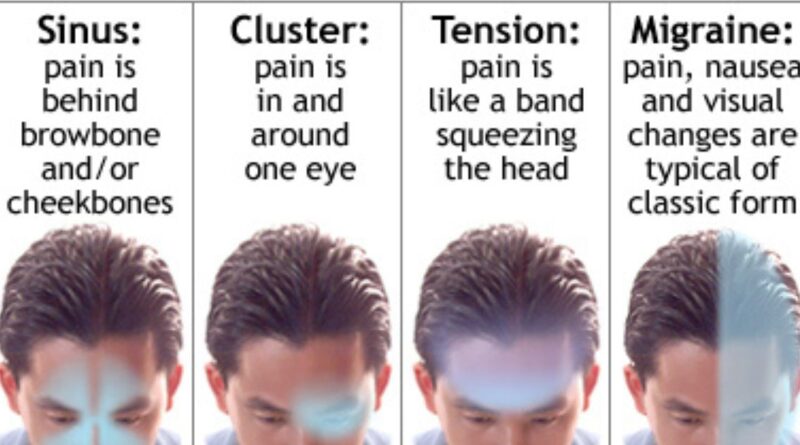What Is Tension Headache
Introduction
Tension headaches arise from the contraction and tensing of muscles around the neck and the scalp. The muscle contractions have been associated with a headache stemming from anxiety, stress, head injury, or depression. They may begin at any age but most frequently occur in adults and older teenagers.
Knowledge About Tension Headaches
Tension headaches are just one of the many types of headaches most people have suffered from sometime in their lives. Typically, they are mild to moderate in intensity and feel as if a tight band encircles the head. This review will look at, among other elements, the cause, signs, and treatment of tension headaches.
What is a Tension Headache?
A tension headache is one of the forms of headache characterized by pressure or tightness around the forehead, temples, or back of the head. This is the most typical form of headache and can be episodic or have chronic pain. It is not usually associated with nausea or sensitivity to light and sound, like migraines.
- Definition: headache that feels like pressure around the head.
- Types: Episodic and chronic.
- Frequency: It may be a daily basis or very rarely.
How To Treat a Tension Headache

Tension headaches are quite common and they may come from a much stressed mind or even bad posture. Below are simple tips on how to relieve within a short time. Understanding the differences between kidney stones and UTI is one of the most effective ways of finding the right treatment for your headache pain.
- Take Break: Rest your eyes and body, especially when working on the best mobile or computer for a long time. It reduces eye strain and muscle tension.
- Relax Your Muscles: Stretch your neck and shoulders a little to loosen any kind of contraction. This will help reduce the pain from the tension causing the headache.
- Stay Hydrated: Proper hydration is a must. Sometimes, dehydration aggravates pain, so keep a bottle handy while using your best mobile.
How to Not Get a Tension Headache?
Tension headaches can be very easily prevented by making minor modifications to your habits. Here are some tips on how.
- Sit Erect: Whichever is your best mobile, sit up straight so you don’t strain your neck and shoulders. Proper posture helps in avoiding the bad effect of tenseness on headache.
- Break: Do not stay for such a long period on your best mobile without resting. Your eyes and muscles will benefit from a few quick breaks.
- Maintain Activity Level: Simple exercises that include stretching can help promote circulation and thus reduce the risk of tension headaches.
How Long Do Tension Headaches Last?

Tension headaches are usually of short duration. The next section discusses the differences of tension headaches.
1.A Few Hours: In most cases, tension headaches last for a few hours. They only tend to come and go, especially when using the latest mobile without resting or taking breaks for a long time.
2.All Day: In other cases, tension headaches last throughout the day, if their cause remains untreated, like in poor posturing or strain from the latest mobile screens.
3.Chronic: If tension headaches become frequent and persist for days, they may be classified as chronic and require some medical checkup.
What Causes a Tension Headache?
Tension headaches result from several causes that stress your body and mind. Here are some common causes.
- Stress: Emotional or mental stress is the most common trigger. Using the best mobile for work or social media increase stress levels and cause headaches.
- Poor Posture: Slouching to sit with the best mobile is very stressful on the neck and shoulder muscles and can cause tension headaches.
- Eye Strain: Holding your gaze in front of screens for a long time without taking some time off to blink and relax may tire out your eyes to a point of causing discomfort and headaches.
Symptoms of Tension Headaches

There are various symptoms that come with tension headaches. “The most common symptom of aching pain that is usually dull and located on both sides of the head.” You can also experience tenderness around your scalp, neck, and shoulder muscles. In comparison to migraine headaches, they only have a lesser instance of nausea or vomiting.
- Dull Pain: It is often mild to moderate in nature.
- Bilateral Pain: This type of pain affects both head sides.
- Muscle Tenderness: Your neck and shoulder muscles may be tender.\
Common Triggers
Knowing what causes tension headaches makes it much easier to deal with and avoid them. Major stimuli include; stress, poor posture, and lack of adequate sleep. Other environmental conditions such as loud noise or bright lights may initiate the start of a tension headache.
- Stress: Both emotional or physical distress is a significant trigger.
- Posture: Bad posture while working or even performing other daily activities can trigger headaches.
- Insomnia: Lack of sleep or poor quality of sleep causes increased frequency of headaches.
How Tension Headaches Develop
Tension headache is the most common form and may last from 30 minutes up to several days. The process will often begin with tension on the muscles in the neck and scalp, which may cause enhanced pain. It usually happens at cases concerning stress and anxiety when the body response causes muscles to be tight.
- Tautness in Neck and Scalp Muscles
- Insidious Onset: It starts with gradual onset and increases gradually.
- Stress Response: Tension is the body’s way to respond to stress.
Tension Headaches vs. Migraine Headaches

Though headache pain is brought about in both tension and migraine headaches, the symptoms vary widely, with the nature of the headache much stronger in a migraine. This condition is accompanied by nausea, vomiting, and sensitivity to light. Regularly, a tension headache will only provide dull, constant discomfort without any other symptoms.
- Tension-type headaches are typically less severe in terms of pain intensity.
- Accompanying Symptoms: Nausea and other symptoms are related to migraines.
- duration: Migraines are longer than tension-type headaches.
Tension Headache Diagnosis
For a long time, doctors have been able to diagnose tension headaches based on description of a patient’s symptoms and history. Frequency, duration, and intensity of headaches may be asked. Other conditions may be excluded by doing tests like CT scan or MRI.
- Patient History: Symptoms and lifestyle factors.
- Physical Exam: Complete assessment of symptoms.
- Diagnostic Tests: To rule out other kinds of headache
Treatment
Medications for tension headache can be initiated by using over-the-counter pain remedies: ibuprofen or acetaminophen. Lifestyle change, stress management, and physical therapy help reduce the symptoms as well.
- Medications: Relatively effective for mild pain
- Stress Management: May include techniques, such as meditation
- Physical Therapy: Can be helpful to release muscle tension in the neck and scalp
Lifestyle Changes to Prevent Tension Headaches

Some lifestyle changes can significantly decrease the number of tension headaches. Exercise frequently, use proper posture, and stay relaxed can be very helpful. Also, drinking water and sleeping enough contribute.
- Exercise Regularly: Exercise reduces stress and improves overall health.
- Hydrate: Dehydration is one of the major factors that cause headache.
- Sleep: Strive for 7-9 hours of sleep per night
What Self Help Relieves?
There are some over the counter as well as prescription drugs that will help with the pain. However, it is not recommended to use these drugs more than two to three times a week; using medication as directed will likely alleviate tension headaches. Some good home remedies include using a cold or warm compress on the forehead, taking deep breaths, or having a warm bath. These may help relax some of the tightness of the muscles, thus gaining relief from the discomfort.
- Compress: Apply an ice pack or a warm towel to the forehead.
- Deep Breathing: These will lower levels of stress and relax the muscles.
- Warm Bath: Taking a warm bath can calm tension.
When to Seek Medical Care
If tension headaches occur frequently or worsen, it is advisable to seek the physician. He can treat possible causes for headaches. In addition, if headaches occur with other symptoms which may not be normal like blurring of vision or confusion, a visit should be made to the doctor sooner.
- Recurring Headaches: Report if you get headaches frequently.
- Exacerbating Pain: If the headache becomes disruptive during the day, visit a doctor.
- New Symptoms: Novel symptoms may be a sign of serious illness.
Conclusion: Treatment of Tension Headaches
Conclusion Therefore, in order to manage and prevent tension headaches effectively, it is important to understand it well. It is, by changing lifestyle activities as well as through the help of medical and home-based treatments in determining what triggers the case, where the impact of having tension headache can be minimized and prevented. Consulting a medical expert must be done if these headaches do not abate.




